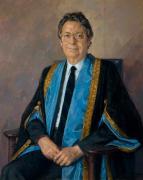|
|
||||||||||||||||||||||||
 |
Featured person
Recently added |
Sir Frederick Rebbeck (1877 - 1961): |
||||||||||||||||||||||

|
| Sir Frederick Rebbeck |
Frederick Ernest Rebbeck was Chief Executive of Harland and Wolff, the almost iconic Belfast firm of shipbuilders, who had to negotiate the firm through the world Depression of the 1930s, the Second World War and its aftermath, and face the challenge of diversification posed by technical and industrial development and change.
Rebbeck was born near Swindon, Wiltshire in southern England; his father was a farmer at Badbury, Chiseldon, who died when Frederick was only a year old; his widow moved to Wantage, in the neighbouring county of Oxfordshire, where she worked as a governess and Frederick was schooled. He was an engineering apprentice in England before moving to Belfast, to Victor Coates, the manufacturer of stationary steam engines, worked for a time at British Westinghouse, Manchester, and returned to Harland & Wolff, this time at their works in Glasgow. In 1926 he was made head of the engine shed, where he was an efficient manager, able to maintain the costly research and development programme despite the cost-cutting necessitated by the decline in the industry in Belfast in the wake of the First World War. By 1930 he was Chief Executive, having bought out Sir Owen Cosby Philipps, who had succeeded Lord Pirrie as head of the firm on Pirrie's death in 1924.
Harland & Wolff was seriously in debt; its creditors, largely the Midland Bank, installed watchdog directors. Rebbeck had imagination, however, and saw the potential in diversification: in 1936 came the creation with the English aircraft manufacturer Short Brothers of a new company, Short Brothers and Harland, mainly to construct large seaplanes which were then much in demand, both for civilian and military purposes. Rebbeck also negotiated with the Admiralty to bring work to Belfast; the Admiralty favoured this, for amongst other reasons the distance from Germany. Rebbeck, who was also a Belfast Harbour Commissioner, was able to secure expansion of Belfast port and harbour.
One major construction project was an aircraft carrier, HMS Formidable, which was launched in August 1939 and commissioned the following year, seeing service throughout the Second World War in a number of notable actions in the Mediterranean, Norway, where her planes attacked the feared German battleship Tirpitz, which was sunk, and the Far East where she survived several Japanese Kamikaze attacks (she was decommissioned in 1947). Amongst other work, the firm also constructed 20 corvettes (small vessels used for coastal patrol work and escorting Atlantic convoys) of the Flower class; the First Lord of the Admiralty, Winston Churchill, telephoned Rebbeck personally in 1939 to tell him of the order, which was completed by January 1941. That same year Rebbeck was knighted; but because of the German military conquest of France, which no-one had anticipated, Belfast could be and was attacked from the air. In April 1941 Harland & Wolff's yards were seriously damaged, and production halved. By 1944, though, the firm was producing a record tonnage.
After the war, production remained relatively healthy, though Rebbeck started to become, in the eyes of some, rather increasingly autocratic and, in contrast to his earlier years, reluctant to introduce new production methods. This was seen as a significant cause of the gradually shrinking profit levels of the firm, though others pointed also to the intermittent industrial unrest which affected the company even during the war. A post-war strike of apprentices was decades later described by a participant, playwright Wilson John Haire. Initially hostile to Rebbeck, he earned their respect by facing them alone without the backing of Harbour Police, whom he dismissed during a confrontation. Rebbeck was described by Haire: "we thought of him after that as a slightly grumpy old granda who would bear no grudges against us. We liked him for daring to come out and face us in person, alone." He was gradually replaced by his son Denis Rebbeck, retiring completely in 1962.
Rebbeck merited a small mention in cinema history. In 1956 the film-maker William MacQuitty, like Rebbeck an Ulsterman and who like Rebbeck had been present at the launch of the Harland & Wolff-built Titanic, was planning to make a film of that most famous of all shipping disasters. To be called A Night to Remember, MacQuitty, who knew Rebbeck, assumed he would be able to film in the shipyards and use film of the launch. Rebbeck refused all such co-operation, as he felt it was too soon after the disaster, especially for an enterprise designed for profit. When MacQuitty suggested the story of the building (rather disingenuously as the film was about its catastrophic sinking) of such a magnificent vessel would make for good publicity for Harland & Wolff, Rebbeck replied: "We don't need advertising."
Throughout his career and into retirement he held directorship and memberships of variety of concerns and bodies mostly but not entirely in the United Kingdom. He was appointed Knight Commander of the British Empire (KBE) in 1953. His son Denis Rebbeck suceeded him at the head of the firm. Frederick Rebbeck died at his home, Sandown House, at Knock in east Belfast.
| Born: | 1877 |
| Died: | 17 June 1961 |
| Richard Froggatt |
| Acknowledgements: Wesley McCann |
| Bibliography: Dictionary of Irish Biography; Swindon Advertiser 3.6.11; William MacQuitty: A Life to Remember, 1991; www.fleetairarmarchive.net; Kevin Johnston: In the Shadows of Giants, Dublin, 2008; Belfast Telegraph, 8.12.2005: "The first apprentices' strike in the yard" (Wilson John Haire); http://www.imdb.com/title/tt0051994/trivia |


Home | Our Policies | Plaques | Browse | Search | Sponsors | Links | Help | Contact
Privacy & Disclaimer | Cookie Policy | Site Map | Website Design By K-Point
© 2024 Ulster History Circle









